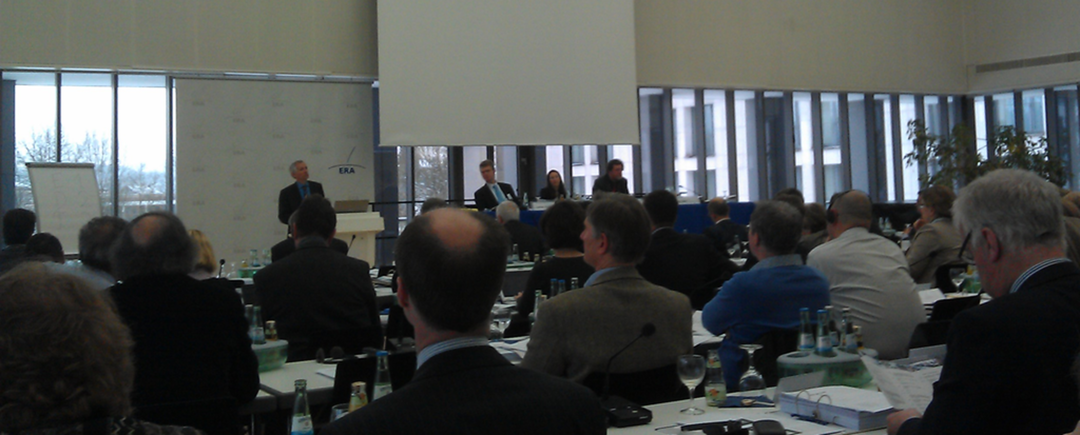EPPOlicy choice (EN, wondering)

I’ve been around too many law-makers, for too long a time, not to be able and spot a policy blunder when I see one… Almost 6 years ago, after the French and the Dutch, but before the Irish NO, I decided to take a look at the policy design behind the idea of establishing a European Public Prosecutor Office (for the protection of the Union’s financial interests). I wasn’t satisfied then, but I could see a way for turning that idea to reality; I’m still not satisfied now, after a 2-day seminar graciously organized by ERA. I wonder what would take for all these people to drive action, rather than only ponder on (and of) the alternatives; and I submit to you that only making a choice, a harsh policy choice, may lead to visible results in the foreseeable future!
photo source: personal archive; Ligeti & Vervaele (center-panel) listening to Zeder (left-lectern); Kuhl presiding (left-panel)
From this perspective, I liked a lot, and I commend, the Ligeti & Vervaele project, as their team proved gutsy enough to make a clear choice with respect to designing the EPPO. [I’m not happy with their choice, which I find too conservative for my taste, but that’s a totally different line of thought.] What they propose is feasible by 2019 (when we celebrate 20 years since the Middelhoek Reports), much more so than what I had suggested in a haste, till 2009. Both in terms of the organizational structure and the model rules of procedure, the Ligeti & Vervaele solution may bring things to a very good start—especially as it’s anchored in extensive research and comparative analysis! My only disappointment relates to seeing this solution as a compromise with the national jurisdictions of the Member States—a very clever compromise, but still a compromise…
What I’d like to see is an EPPO with pan-European jurisdiction, anchored not in the clumsy text of the Treaty, but in the Charter of Fundamental Rights! [Yes, I am aware that I want a lot, I want too much, I want it all and I want it now—but I’m an odd bird, anyways 😉 ] This goes to the heart of that policy choice that got me started: I am a strong believer in the development of a truly European citizenship, but it’s the Member States that actually get in the way, as visible in the formulation of art. 86. The heads of states and governments that negotiated the Treaty of Lisbon simply couldn’t make up their minds as to whether they wanted to build a pan-European state, or they only wanted to preserve their positions of power within their respective national governments. And that lack of choice—that postponement, that insecurity—simply translated into a legal wording that keeps EPPO in the past, rather than projecting it into the future 🙁
And the past is quite clear, if one reads carefully the 3-staged approach in Recommendation 59 of the Middelhoek Reports of almost 14 years ago, when we didn’t even have the €uro (or its crisis), when Justice was part of the Third Pillar, when CVM (MCV) wouldn’t have crossed anybody’s mind, when the fiscal compact or the banking union may have looked like a joke or a Sci-Fi scenario… We still haven’t met the full prerequisites of stages 1 & 2, so I say keeping in the same key, with the same approach, we won’t get the job done at stage 3, either 🙁 In the meanwhile, we adopted the Charter in 2000, and decided to append it to the Treaty of Lisbon, which means we agree to having a set of common, pan-European values, whereof spring rights recognized as fundamental. Now, shifting the lens, say, to the social contract, I submit to you that such rights must be defended by means of a sole prosecuting institution, with plenary powers across the entire territory of the Union, as well as full-fledged authority over any and all of the Union’s citizens!
This is my maximal view, and (based on this vision, if you’d allow the word-choice) I’d argue that EPPO cannot depend on the Member States in no way, shape or form! Of course, this raises lots of subsequent problems, concerns and challenges 😉 I believe that every prosecutor in EU-land should be part of EPPO, regardless of their nationality—it should be up to EPPO to decide what crimes to be investigated EU-wide, and what left to its deconcentrated structures that currently function in the administrative units that we still call Member States 😉 Of course, I guess that would make the entire courts of the Union subservient to the ECJ, and we still have to find a solution to differentiating prosecutors and judges from some odd juges d’instruction here and there…
True, what I want is complicated and distant, from a political perspective (that’s why I call the text of art. 86 a blunder)—but I believe it’s uncompromising and feasible, from a strictly prosecutorial-cooperation perspective! While my maximal view (based on the expectation or assumption that prosecutors all over the EU are independent magistrates) would need to subdue national politics, in order to drive the policy choice, Ligeti & Vervaele’s solution compromises with the Member States, trying to make sense of a non-choice… Indeed, they may stand a better chance than I do; but that doesn’t make my civil society perspective less applicable, valuable or true, does it?!? 😉 I still trust that discussing such conflicting views may lead to consensus on the appropriate policy choice and the ensuing course of action!
à la fin de chaque vérité, il faut ajouter qu’on se souvient de la vérité oposée
—Pascal
